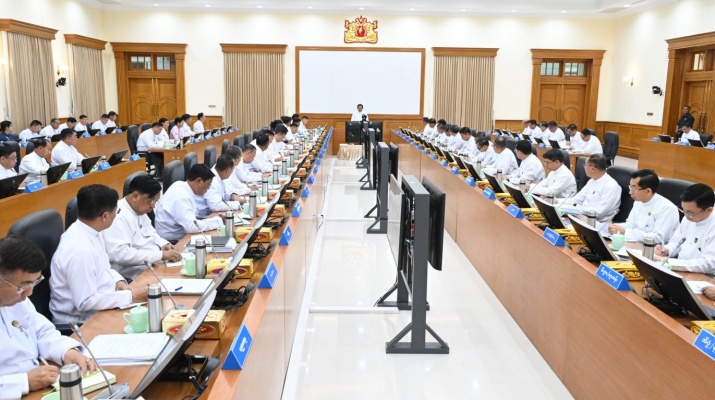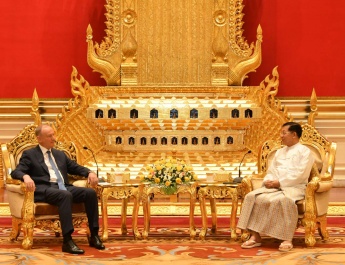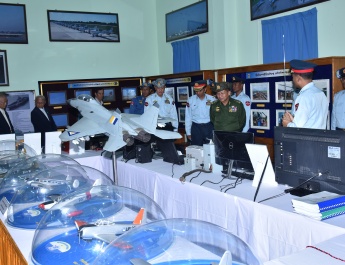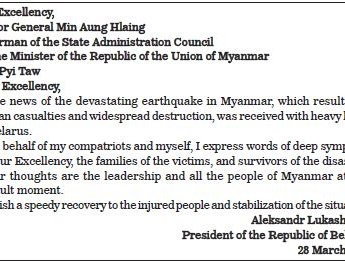NAY PYI TAW May 19
The State Administration Council government held its work coordination meeting at the SAC Chairman’s Office here this morning, addressed by Chairman of State Administration Council Prime Minister Senior General Min Aung Hlaing.
Also present were Vice Chairman of State Administration Council Deputy Prime Minister Vice-Senior General Soe Win, SAC Secretary General Aung Lin Dway, SAC Joint Secretary General Ye Win Oo, SAC members, union level dignitaries, union ministers, the Nay Pyi Taw Council chair, region/state chief ministers, and deputy ministers.
Political developments
In his keynote address, the Senior General said the SAC government assumed the duties of the State in accord with the 2008 Constitution because of vote rigging in 2020 multi-party democracy general election. Since its assumption of the duties, the SAC government has appointed both military personnel and civilians as union level dignitaries, region/state chief ministers in a fair manner. During its days in office, the SAC government has striven to achieve success in carrying out the task.
Throughout history of Myanmar, educational and economic weaknesses can be found in regions and states. Those weaknesses have led to the appearance of political instigations throughout the successive periods, and they were recorded in history as lessons of the past. Non-disintegration of Union was taken into account in writing the 2008 Constitution and adopting multi-party democracy. Federal rights are also included in the rights the 2008 Constitution has provided to regions and states.
After the 2010 multi-party democracy general election, the state duties were transferred to the party that won the election. During its administration under multi-party democracy, disagreements appeared in the ruling party. During the term of the first democracy government, negotiations were held with EAOs for achieving internal peace, and the nationwide ceasefire agreement (NCA) could be signed. During the time, the opposition NLD party launched anti-NCA campaigns.
Tatmadaw provided cooperation to the most possible degree during the term of the second democracy government in 2015. The said government had never organized a National Defence and Security Council meeting even in the times that were vital for the country. In addition, it approved the unlawful provisions and did many acts that were against the law.
The nation saw an about Ks-12 billion trade deficit during the first democracy government, and another about Ks-12 billion during the second democracy government, about Ks-25 billion mark. The governments tried to solve the problem with foreign aid, loans and income from non-trade activities. The data showed an increase in the number of students at schools during the first democracy government. But it dropped during the COVID-19 epidemic. Such trends in education must be aware of.
The State Peace and Development Council government set up special regions for achieving internal peace in 1989. The first democracy government was able to sign the NCA. There were a lot of hardships in the peace process throughout history. The second demo-cracy government changed the name of the peace conference to 21st century Panglong conference. Hence, the appearance of possible hardships due to historical events had to be notified.
The Tatmadaw realized the way to multiparty democracy. The Tatmadaw had already declared the adoption of multi-party democracy in 1988, according to the aspiration of the people. As the name of the book “the country was young, and the storm was fierce” compiled by Col Tin Maung (retired), during that time, democracy was young, and the storm was fierce.
As the government has taken responsibilities of the State in accordance with the 2008 Constitution, it is essential to proceed towards a multi-party democratic system desired by the people. Therefore, elections must be held as originally intended. It would be best if elections could be held on a nationwide scale. However, just as it was not possible to achieve full implementation in the multiparty general elections of 2010, 2015, and 2020, the election was held amidst various difficulties during the AFPFL period. In holding elections, it is important that they are free, fair,
and successful. The Constitution outlines significant provisions regarding the convening of the Hluttaw (Parliament) under Sections 85, 128, and 155. A review of the laws shows that elections can be held successfully with substantial participation. Administering national affairs through an elected government is ultimately the best course for the country. The Constitution also stipulates that elections can be held based on the final decision of the National Defence and Security Council.
In carrying out political responsibilities, the government is implementing the separation of powers among the legislative, executive, and judicial branches. With regard to administration, authority has been delegated from the ward and village levels up to the state and region levels. The government is operating in accordance with the policies laid down by the Constitution of the Republic of the Union of Myanmar. Therefore, it is necessary for those from administrative bodies at the state and regional levels, as well as at the district, township, ward, and village levels, to possess sufficient qualifications. Those who hold administrative responsibilities and civil servants must remain free from party politics. Accordingly, administrators must not only be well-qualified but also possess administrative competence, legal knowledge, and a vision for regional development.
Development of education sector must be initiated
In order to carry out such tasks effectively, it is essential to develop qualified and capable human resources. It is also necessary to implement economic development, as only with the presence of educated individuals can the future of the nation be assured with confidence. Therefore, it is important to consistently hold this belief. Our country has faced weaknesses in the education sector since before gaining independence. This can be understood by studying the historical background of the nation. There are also historical records indicating that, during the reign of ancient kings, scholars were sent to European countries for further study. Thus, it is necessary to revisit and analyze the education systems practised during the monarchical era and those used across generations. Regarding the weaknesses in education, reforms and improvements must be actively undertaken to enhance the sector. The State Administration Council in its tenure has worked to significantly improve the education system. At education conferences, not only were topics presented, but practical decisions on how to enhance the education system were made and implement-ed. It is also necessary to consider how students who sat for matriculation exams but were unsuccessful can still contribute meaningfully to the nation. Therefore, in consultation with responsible officials and experts, efforts have been made to introduce polytechnic education in relevant fields so that students can enter the workforce. The establishment of Polytechnic Universities that combine computer studies and technology has been successful, and tangible outcomes have been observed. It is crucial for us to manage and implement educational reforms with a long-term perspective in mind. Many students drop out as early as the middle school level. As a result, schools offering vocational training in agriculture, livestock breeding, and industrial arts have been opened and have achieved notable success. It is essential to produce skilled professionals in the fields of agriculture, livestock, and industry.
Due to the powerful Mandalay earth-quake that struck on 28 March, some matriculation exam answer sheets were damaged or destroyed. As a result, arrangements had to be made for the exams to be retaken. Although there have been suggestions to grant passing marks through leniency since the damage was caused by a natural disaster, it was decided that students should retake the exams in accordance with academic integrity and international standards. The government has also been providing necessary support and assistance to ensure smooth and convenient conditions for students and teachers in the areas where the exams are to be retaken.
Regarding the reopening of schools, May 22nd marks the beginning of school enrollment week. Regional and state chief ministers, along with responsible officials, must ensure that all schools in their respective areas are able to reopen. It is essential that terrorist groups refrain from any actions that disrupt education. If the education sector is obstructed or destroyed, the affected regions will lag behind others. Terrorists must understand that under-mining education is tantamount to destroying their own future.
Promoting the health sector
The health sector still faces significant challenges. Daily social activities often lack health-conscious behaviour, and public awareness regarding health remains insufficient. In some regions, violence and conflicts have further weakened healthcare systems. Improving health outcomes is not solely the responsibility of medical professionals but requires cooperation from all related personnel and the general public. The government has implemented key policies, including the principle that only the healthy can work and study, the recognition that nothing is more valuable than human life, and the mandate that every hospital must have doctors. Efforts have been made to deploy necessary health workers and provide medical supplies. When the current administration assumed office, many civil servants, including health workers, had already left their posts. During the COVID-19 pandemic and political conflicts, the government mobilized available resources to address these crises, even deploying military doctors and medics across the country to ensure treatment. The primary focus remains on safeguarding public health. Further improvements are needed, particularly in hospital infrastructure and land allocation. Education and healthcare are fundamental sectors that require sustained investment and collaboration. Officials at all levels, including regional and state authorities, must work together to strengthen these areas.
Preparing for natural disasters
Myanmar has endured severe natural disasters, including pandemics, extreme weather events, conflicts, and earth-quakes, resulting in substantial losses for both the state and its citizens. In 2023, Cyclone Mocha struck Rakhine State, causing damages worth Ks-534.146 billion. The government allocated over Ks-73.797 billion for recovery efforts, let alone spending by the public. The following year, Cyclone Yagi brought torrential rains, leading to losses of Ks-466.231 billion, with Ks-54.807 billion designated for reconstruction. Additionally, the March 28 earthquake in Mandalay resulted in damages totaling Ks-3,629.288 billion, and recovery operations are still underway. Without these disasters, the country’s development progress would have been far greater. Beyond natural calamities, terrorist activities have also inflicted heavy casualties, destroyed public infrastructure, and caused significant losses to civilian property—all of which represent major setbacks for the nation. To minimize the impact of such disasters, robust preparedness measures are essential. At the same time, armed conflicts continue to cause immense destruction, underscoring the urgent need for peace-building efforts.
Regarding the economy, it is essential for a country to be economically strong to achieve progress. It is the responsibility of the government to strengthen the economy. As the country’s GDP is lower than that of neighboring countries, greater efforts must be exerted than are currently being made. The government will focus on setting policies, while the regions and states will be responsible for their effective implementation. It is the government’s duty to create employment opportunities and promote job growth. To support this, loans are being provided, and necessary needs are being addressed. However, the work carried out by the regions and states has not been as successful as expected. It is evident that the goals and objectives in agricultural activities have not yet been achieved. In the case of oilseed crops, yields remain low, and the country still relies on imports. According to calculations, the national income has declined by over US$-8 billion as a result of falling short of the agricultural production targets. If the full potential of sequential cropping is utilized, it could generate an additional revenue of approximately US$-14 billion. Although the country possesses fertile land and labor resources, income levels remain low due to the lack of practical implementation. Another important factor to consider is the instability of currency values. If domestic goods production can be increased to boost national income, it would help stabilize the currency and prevent a rise in commodity prices. Therefore, it is essential to carry out responsibilities effectively and actively promote economic growth. It is necessary to identify solutions to the rising cost of goods and to take measures to address the high cost of production as well as the imbalance between supply and demand. Therefore, efforts must be made to increase pro-duction.
The provision of adequate electricity and the improvement of road connectivity
Regarding the electricity sector, there was a need that was addressed by utilizing solar energy to provide electricity in a short time. Although terrorists have been destroying, disrupting, and threatening factories, workshops, and electricity transmission towers to hinder electricity generation, appreciation is extended to the employees of the Ministry of Electric Power for their dedicated efforts in ensuring the provision of electricity. It is also observed that the Ministry of Transport and Communications is making efforts to repair damage caused by terrorist bombings and the destruction of roads and bridges within days and hours. It was also noted that the Ministry of Construction is working to repair damaged roads and bridges as promptly as possible. Without effective transportation and communication, numerous challenges arise in achieving economic development, which in turn impacts the socio-economic lives of the people. Therefore, the efforts of the relevant ministries are duly recognized. He discussed the importance of establishing a government that the public can trust and rely on, as well as the need to create a positive historical legacy.
Subsequently, the Chairman of the Nay Pyi Taw Council and the Chief Ministers of the Regions and States discussed and presented regional data summaries by region and state, the status of regional development activities, current progress in the administrative, economic, and social sectors, as well as general reports. The first day of the coordination meeting was reportedly concluded in the evening.





